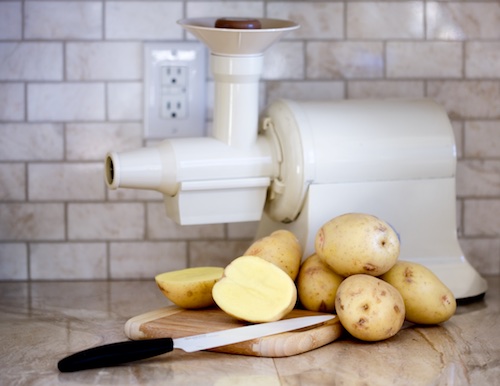 I just heard yesterday about drinking raw potato juice. It is supposedly a panacea… anti-inflammatory, diabetes, cancer, heart trouble, etc. I have no personal knowledge on the subject but when I Googled it, a lot came up. According to Dr. Kuai, a local acupuncture practitioner, Chinese traditional medicine says to drink 8 oz. twice daily on an empty stomach and do not eat anything else for an hour at least. He says some honey can be added for flavor. Online, some say carrot juice can be added for flavor. Use only the thin-skinned, white potatoes. Cut out any black spots, green patches, sprouts, etc. before juicing. The skin of those potatoes, I am told, is fine to leave on when juicing.
I just heard yesterday about drinking raw potato juice. It is supposedly a panacea… anti-inflammatory, diabetes, cancer, heart trouble, etc. I have no personal knowledge on the subject but when I Googled it, a lot came up. According to Dr. Kuai, a local acupuncture practitioner, Chinese traditional medicine says to drink 8 oz. twice daily on an empty stomach and do not eat anything else for an hour at least. He says some honey can be added for flavor. Online, some say carrot juice can be added for flavor. Use only the thin-skinned, white potatoes. Cut out any black spots, green patches, sprouts, etc. before juicing. The skin of those potatoes, I am told, is fine to leave on when juicing.
I do not know anything more and cannot say from my own experience if it is useful or not. I can’t imagine how it can hurt so I am going to give it a try.
If anyone has knowledge or personal experience with this, please post your comment.








I tried it long time ago just for the fun of it. It was a diet recommended by a health-promoting group.
Rayshan, could you tell any difference when you drank it? Did you think that it help or hurt, any? Or no recollection?
Sometimes I think pitta could be inflammation in the body, right?
– Maura
I had raw potato juice with other particular vegetables juiced when I had Chronic Fatigue Syndrome and Fibromyalgia 25 years ago. It was part of my healing protocol. I don’t recall if it helped or not.
Maura, I don’t recall it made any impact on me.
Wow, potato juice seems kind of out there, but I am curious to hear more. Hopefully it helps some folks…
Sorry, I have not had any personal experience with potato juice. I know I used to enjoy eating pieces of raw potato when I was preparing them for cooking.
In general we know that most fruits and vegetables and even some grains can be ground up and then either strained or pressed to make juices. And each food/juice has its own nutritional profile.
My understanding is that different people will be attracted to different juices as therapies or nutritional food sources based on the nutritional profile of each juice or plant, and the nutritional need of that individual at the time.
Norman Walker wrote many books about the benefits of carrot juice, and mixing carrot juice with celery, beet, spinach, and other vegetables in various proportions. He invented a juicer (called the Norwalk) that used a hydraulic press to get every last possible value of nutrient out of the fiber of the plant. And he lived to be over 100 years old.
Arnold Ehret taught (among many other things) the benefits of grape juices.
Ann Wigmore taught about the benefits of wheat grass juice, and claimed it saved her life. There are special machines now that make wheat grass juice.
Most recently there has been a lot of research about the benefits of beets and beet juice for athletes (and others.) An overview of the research is found in the second half of this article: http://www.mauldineconomics.com/tech/tech-digest/benefits-of-fasting-and-beets-as-a-legitimate-super-food.
That article has links to several studies. One of the links talks about research that shows beet root juice boosting stamina: http://sshs.exeter.ac.uk/news/research/title_37371_en.html
My sense is that the nutritional profile of beet juice is more towards what my body will benefit from at this time than potato juice. And I’m grateful to Michaelji for sharing the information. I’ll keep it “on the shelf” for future reference.